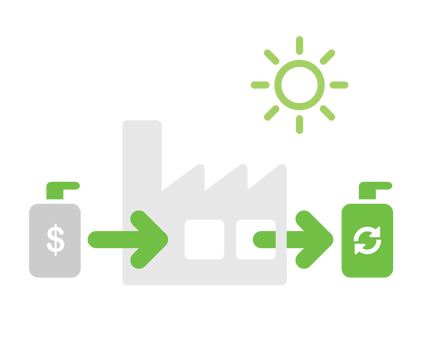This blogpost is part of a series that was created to inspire CEOs to become Chief Environmental Officers. Read our other posts on how to rethink packaging, distribution or the product itself.
Recyclable and recycled materials have become trendy, but most of the time, these are just empty buzzwords. What really matters is whether something actually gets recycled. Claiming that apackaging is recyclable – as several companies do – does not mean anything. And the statistics are alarming: companies have only recycled about 9% of all plastic ever produced. This means most of the time even the trendiest recyclable material will become simply rubbish.
There are products however, like bottled alcoholic beverages, which offer the return-on-the-go model to have their containers collected. Why can’t we apply this idea method to more products? The idea behind container-deposit fees is to prevent the containers becoming useless trash. By incentivising customers to return them you will be able to recycle or reuse them.

The return-on-the-go system once was popular in Hungary as well. Everyone knew about how much a soft drink container or a beer bottle was worth if you returned it to the store. Putting a small price on the packaging helps you keep it away from the environment.
The deposit fee also gives you the opportunity to introduce new kind of packaging materials. Since it will rotate in the system for a longer time, you can make sure to invest in the best and most durable option.
A good example of the application of deposit fees in a new area is the steel food box introduced by the team of Felelős Gasztrohős Budapest restaurants. Their goal is to reduce the amount of disposable plastic takeaway boxes. You pay for the steel foodbox only once, after which it can be swapped for a new box when buying food from any of the restaurants participating in the program. This system was invented because a lot of restaurants don’t provide food in the customer’s own boxes for sanitary reasons. But with this environmentally conscious solution the buyer receives their food in a clean – and identical – container.
The return-on-the-go beer cups at music festivals also greatly reduce plastic waste, as disposable plastic cups can account for up to 60% of the waste generated at an event. Most of these disposable cups never gets recycled. On top of that, the new cups have a longer lifespan, are washable, and, like glass cups, can be used over and over again.
